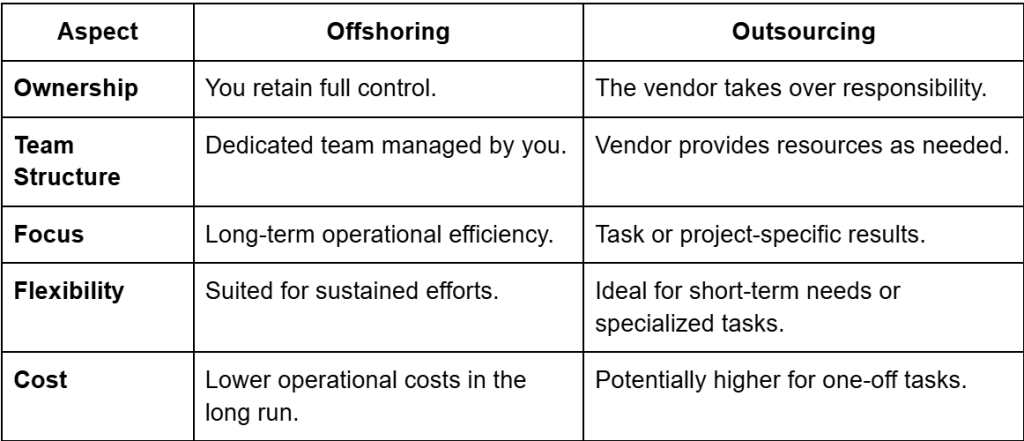Learn how accounting services in India streamline finances, taxes, and...

How to Choose the Best Country for Offshoring
November 22, 2024
Top 5 Countries for Setting Up an Offshore Development Center
November 28, 2024Offshoring vs. Outsourcing: What’s the Difference?
In the ever-evolving world of business and technology, terms like “offshoring” and “outsourcing” often seem interchangeable. But let’s clear the fog: they aren’t the same. Think of them as siblings—similar, yet distinct in their essence. Understanding the difference can help businesses make informed decisions, particularly when navigating the complex world of IT services.
So, let’s unravel these concepts, explore their nuances, and see why India continues to shine as a global leader in both.
Table of Content
Offshoring: A Closer Look
Offshoring refers to relocating your business operations to another country. Unlike outsourcing, where you delegate tasks to a third party, offshoring typically involves setting up your own dedicated team or facility overseas.
For example, when you establish an offshore development centre (ODC) to work exclusively on your projects, it’s offshoring in action. These teams function as an extension of your in-house staff but operate from a different location, often in countries where costs are lower, and talent pools are deeper.
Key benefits of offshoring include:
- Cost Savings: Significant reductions in labor and operational expenses.
- Dedicated Teams: Direct control over an ODC team in India or elsewhere ensures better alignment with your business goals.
- Global Talent: Access to highly skilled professionals unavailable locally.
Outsourcing: A World Apart

Outsourcing, on the other hand, involves contracting a third-party company to handle specific tasks or projects. Unlike offshoring, where you build your team, outsourcing delegates the responsibility entirely to the external partner.
For instance, hiring an offshore development company India to create your software product is outsourcing. The vendor manages everything—resources, timelines, and deliverables.
Why businesses outsource:
- Expertise On Demand: Outsourcing to companies offering offshore software development services gives access to niche skills without long-term commitments.
- Flexibility: Scale up or down based on project needs.
Speed: Leveraging an external team can fast-track projects without stretching internal resources.
Key Differences Between Offshoring and Outsourcing

Why India Excels in Both Offshoring and Outsourcing

When it comes to IT services, India stands tall as the undisputed leader. Whether you’re planning to build an offshore development center or outsource a project, here’s why India should top your list:
1. Massive Talent Pool
India is home to over 4.5 million IT professionals, with over 1.5 million engineering graduates annually. This ensures a steady stream of highly skilled offshore developers ready to take on challenges ranging from app development to AI integration.
2. Cost Advantage
Labor costs in India are significantly lower than in Western countries. Hiring an ODC team in India or partnering with an offshore development company offers savings of up to 60-70%, making high-quality IT services affordable.
3. Time Zone Compatibility
India’s time zone (GMT+5:30) enables round-the-clock productivity. While your local team sleeps, your offshore development center works, ensuring faster delivery and minimized downtime.
4. Global Trust and Proven Expertise
India’s IT export industry is valued at over $200 billion annually, contributing 8% of the country’s GDP. Giants like Google, Microsoft, and IBM rely on India’s offshore software development services, highlighting the country’s proven track record.
5. Cultural and Linguistic Compatibility
India’s workforce is fluent in English—the global language of business—and culturally adept at collaborating with international teams.
Choosing the Right Model for Your Business
Both offshoring and outsourcing have their place, but the best choice depends on your specific needs. Here’s a quick guide:
- Choose Offshoring if:
- You need long-term, consistent support.
- You want direct control over your team.
- You’re looking to build a scalable IT backbone.
- Choose Outsourcing if:
- You have short-term or highly specialized tasks.
- You need to focus on core business functions.
- You prefer vendors to manage project outcomes.
The Future of Offshoring and Outsourcing

The demand for IT offshoring and outsourcing is expected to grow exponentially, with the global outsourcing market projected to reach $586 billion by 2027. As businesses continue to embrace remote and distributed models, India’s dominance in this field is poised to expand.
Conclusion: The Best of Both Worlds
Offshoring or outsourcing isn’t an either-or choice—it’s about leveraging the strengths of each to achieve your goals. Whether you need dedicated teams through an ODC team in India or are seeking one-time expertise from offshore developers, India provides a fertile ground for success.
With its unbeatable mix of talent, cost, and infrastructure, India remains the gold standard for businesses worldwide. So, what’s stopping you from tapping into this powerhouse?
Recent Post
Step-by-Step Guide to Setting Up Accounting Services in India for Your Business
Explore the step-by-step process of setting up accounting services in...
Offshore Development Centre for UAE Businesses | iValuePlus
Explore how UAE businesses can scale faster with an Offshore...








